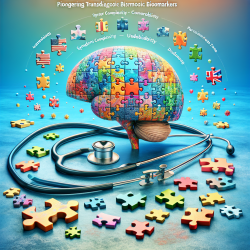Introduction
As practitioners in the field of speech-language pathology, it is crucial to stay informed about the latest research and advancements that can enhance our therapeutic approaches, especially when working with children. The Proceedings of the WFNS Neuro-Oncology Committee Workshop Rome 2015 offers valuable insights into the integration of multidisciplinary approaches in managing brain tumor patients. This blog will explore how findings from this research can be applied to improve outcomes for children receiving therapy services.
Data-Driven Decisions in Therapy
The workshop highlighted the importance of a data-driven approach in neuro-oncology, emphasizing the need for integrating multiple disciplines to achieve optimal patient outcomes. In speech-language pathology, adopting a similar strategy can significantly benefit children, particularly those with complex needs such as brain tumors or related neurological conditions.
By utilizing data from comprehensive assessments and collaborating with other healthcare professionals, therapists can develop tailored intervention plans that address the specific needs of each child. This approach not only enhances the effectiveness of therapy but also ensures that all aspects of the child's development are considered.
Implementing Research Findings
The research presented at the workshop underscores the importance of addressing both tangible and intangible factors affecting health-related quality of life (HRQOL). For children undergoing therapy, this means looking beyond traditional speech and language goals to consider factors such as emotional well-being, social interactions, and overall quality of life.
- Utilize comprehensive assessment tools to gather data on various aspects of a child's life.
- Collaborate with a multidisciplinary team to address the child's holistic needs.
- Incorporate family and caregiver input to ensure therapy aligns with the child's daily life and routines.
Encouraging Further Research
While the current research provides a strong foundation, there is always room for further exploration. Practitioners are encouraged to engage in ongoing research to uncover new insights and refine existing therapeutic approaches. By participating in research, therapists can contribute to the development of evidence-based practices that benefit children worldwide.
Moreover, staying updated with the latest findings allows practitioners to incorporate cutting-edge techniques and technologies into their practice, ultimately enhancing the quality of care provided to children.
Conclusion
Integrating findings from the WFNS Neuro-Oncology Committee Workshop into speech-language pathology practice can lead to significant improvements in therapy outcomes for children. By focusing on data-driven decisions and multidisciplinary collaboration, therapists can create more effective and comprehensive intervention plans. For those interested in delving deeper into the research, I highly recommend reading the original paper: Proceedings of the WFNS Neuro-Oncology Committee Workshop Rome 2015.










